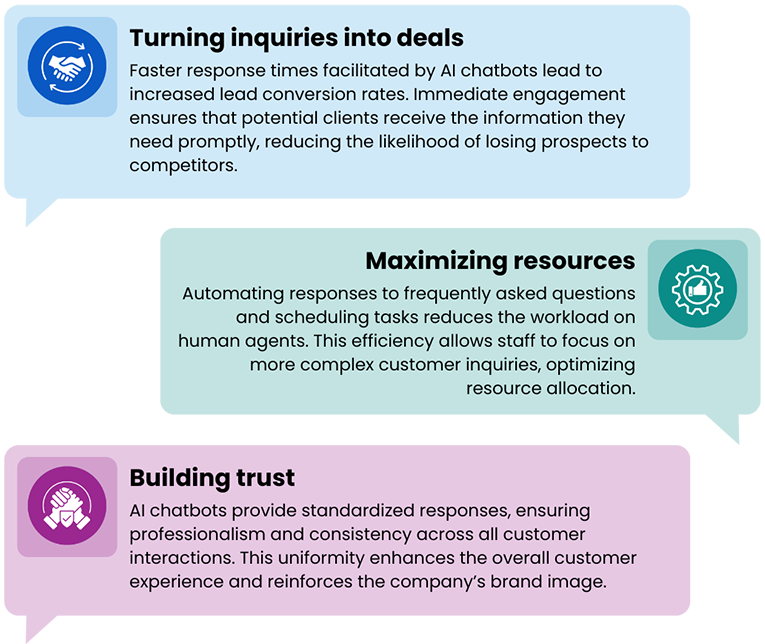Every second counts in today’s fast-paced real estate market, where speed and efficiency can make or break a deal. Potential real estate buyers and tenants expect swift responses to their inquiries, and delays can result in lost opportunities. Traditional communication and information support methods, such as phone calls and emails, often lead to prolonged response times, hindering satisfaction and engagement. To address these challenges, real estate firms are turning to AI chatbots as scalable solutions to enhance customer experience.
How AI Chatbots Transform Customer Support

AI chatbots are designed to handle inquiries in real-time, around the clock, significantly reducing customer wait times. This continuous availability prevents potential leads from losing interest due to delayed responses.

By integrating with digital calendars, AI chatbots can instantly schedule appointments like property viewing, eliminating the need for back-and-forth communication. This automation enhances customer convenience and streamlines the scheduling process.

AI chatbots can collect customer preferences and provide tailored property recommendations, enhancing the personalization of the customer experience. Additionally, they can qualify leads by assessing customer needs before routing them to human agents for high-value interactions.

AI chatbots, powered by large language models (LLMs) and tailored e-LLM systems, serve as a central hub for real estate information. They quickly access and process property details, market trends, and documents to provide accurate, detailed responses. This advanced capability allows for more informed customer interactions and efficient service, and centralized access ensures clients receive consistent and updated information.
The Strategic Advantage of AI Chatbots

Singapore-based Sterling Estates implemented an AI chatbot to enhance lead management and customer engagement. The chatbot, integrated with WhatsApp and Facebook Messenger, resulted in reduced response times, a 45% increase in converting inquiries into property viewings, and 24/7 availability. This case study exemplifies how AI chatbots can streamline operations, enhance customer engagement, and drive growth in the real estate sector.
Implementing AI Chatbots in Your Real Estate Business
Stratpoint offers expertise in developing AI-driven solutions tailored for real estate firms. Our team of experts can seamlessly integrate chatbots into your existing digital platforms, including CRMs, websites, and mobile apps, ensuring they integrate well within your current digital ecosystem.
ChaMi: Stratpoint’s Managed AI Chatbot
ChaMi, Stratpoint’s AI-powered chatbot, is designed to enhance customer service in various industries, including real estate. It comes with data analytics, a lead management platform, a helpdesk, and a ticketing system designed to empower support teams. Implementing ChaMi can significantly elevate customer relationships and satisfaction by providing consistent and efficient support.
Enhance Customer Support with AI Chatbot
AI chatbots revolutionize how real estate firms connect with their clients by providing immediate responses, automating scheduling and other tasks, and ensuring 24/7 availability. Real estate firms that adopt these intelligent assistants can expect higher customer engagement, improved operational efficiency, and a superior overall customer experience.
Explore how AI-driven customer support solutions can benefit your real estate business. Fill out the form below to schedule a discovery call with Stratpoint AI experts.




